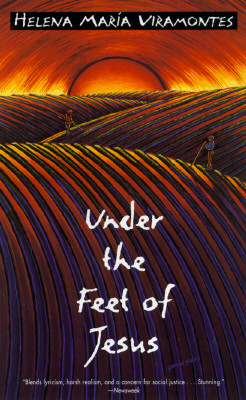
Under the Feet of Jesus by Helena María Viramontes
Reading assignment for Monday, November 12. Your reply (under Comments) is due before class.
Be sure to check and make sure your response posts.
Describe and discuss Estrella’s life and her coming of age. What is her position in her family? In her community? How does the barn fit in with the narrative?
How does the barn fit in to the novel? What is Estella’s relationship with her mother Petra? With Perfecto?

one of estrella’s coming of age moments was having to take care of Alejo while he is very sick and then having to leave him at the hospital. Their whole relationship contributed to her coming of age. She had experienced romance and had to face a huge challenge of taking care of him and seeing Alejo get sicker and sicker.
“Is that what happens? Estrella thought, people just use you until you are all used up, then rip you into pieces when they’re finished using you?” (75) The Barn symbolizes how Estrella feels about her life. In the last quote she is comparing the barn to how she feels she is just used by working in the fields.
The Barn is also used to show what will happen later in the novel. “someone died in there, Perfecto said…Why do you think people stay away? The Harelip boy comes here all the time.”(75) Here it is showing that Alejo will die later in the novel.
At the novels end I think the barn shows us what Estrella’s fate is. She escapes out of the barn onto the roof. She is looking at the stars. “No wonder the angels had picked a place a place like this to exist…Estrella remained as immobile as an angel standing on the verge of faith…she believed her heart powerful enough to summon home all those who strayed”(175) This image seems to suggests that she eventually escapes this life and find herself and a better life.
It is very interesting how you connected the death of a “boy” in the barn to be Alejo. I never looked at it that way, but Alejo did cross my mind, however we are not sure if he died at the hospital or survived. The ending was a bit confusing to me, but your understanding of it is nice.
Thanks.
Estrella had many coming of age moments. I remember reading of how the twins called her mom. When their father left, the mother entered a trance so Estrella was forced to look after her sisters and find food to feed them. Or even the time that the mother had bit her finger and was rinsing it out in the bathroom while the kids where crying. The mother frustrated told them to stop, but Estrella told her mother to stop.
Caring for Alejo was definitely a coming of age moment, however the incident with the nurse was much more powerful to me, because Estrella said she felt so conscious about her appearance next to her white uniform. When Estrella threatened her with the tool and notice how perfect her lipstick was touching. While people suffer, others worry about superficial things.
I think that Estrella’s coming of age kind of culminates in the very last chapter as the novels ends with her standing on the roof of the barn. It is a difficult gesture to understand, but I think it sort of represents Estrella and all of the difficulties that she has been put through in life, and how so far she’s been able to overcome them. She climbs the mysterious chain that hangs in the barn and ends up standing on the roof. Viramontes describes it as “if she were climbing out of a box” (175). I think the act is rather significant, because it’s not just her climbing out of the box that is the barn, but sort of coming out of the box that is her life and the confining features of it. She’s a strong willed young woman, who is sometimes at odds with the ideas of her mother Petra and Perfecto, but she seems to accomplish things herself. It seems that this is Viramontes’ commentary on feminism and the power of the woman.
This is a powerful story that demonstrates how thirteen-year-old girl manages through all the trial and tribulations thrown her way. However, it is important to recognize that this isn’t just about Estella. I was able to identify with Petra, Estella’s mother, a woman who must persevere despite the task of having to raise five children on her own. This reminds me a lot of my own family situation. My mother decided to migrate to the United States in hopes of finding better working conditions, and she has had to raise three kids all on her own. I’m definitely much fortunate for never having to work out on produce fields, but that’s something else. It seems as if Petra is assisted by Perfecto, but just how invested is he? The sad reality is that it doesn’t seem like he’s invested at all. He plans to save up money to leave and reunite with his first love. His hopes and dreams shatter when he realizes that he will not be able to do that anymore. Could this be considered a coming of age moment in itself? We talk about coming of age as being non-linear, but when do people stop experiencing their coming of age moments?